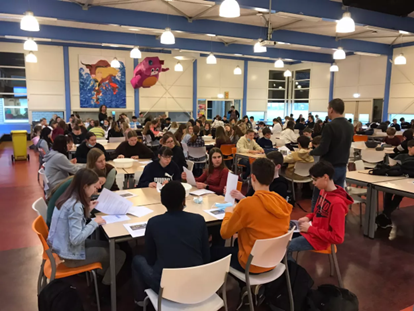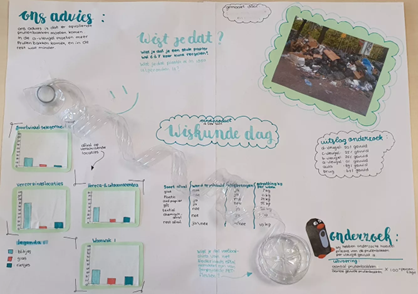The Math-Day-15 was devoted to waste
Mathematics is more than performing procedures and also includes higher-order thinking skills like mathematical problem solving, creativity, reasoning, modelling and communicating mathematics. To support schools in assessing these skills in an authentic way, Utrecht University organizes a yearly Mathematics in Teams event in the Netherlands. The Math-Day-15 event in year 2021-2022 was devoted to waste in close collaboration with the MOST project. More than 1000 secondary school students (3havo/vwo, age 15) from at least 13 schools worked for a day in teams of three-four students on a ‘large’ and open problem.

Students at one of the schools.

A poster supporting an advice on the location of dust bins.
Is waste a problem?
Often it is: the plastic ‘soup’ in the oceans is a major problem. Worldwide, people are looking for solutions for this. In 2021, a deposit was introduced on small plastic drinking bottles in the Netherlands, so that the cans do not end up in the sea. But waste can also be a problem closer to home and school: chewing gum and cigarette butts on the street, litter around schools and supermarkets, leftover food that attracts rats, and so on. Students had to develop a plan to improve the waste situation in and around your school. First, they were encouraged to look at data about waste they produced for one week at home, compare this with yearly numbers for households in the Netherlands, followed by a research in and around their schools.
As a final product, they had to create evidence-based advises for the school on how to deal with waste (even) better.
A teacher reflection:
“My students spent an entire day enthusiastically working on the assignment. They reported that it was amazingly fun to spend a day doing math. The homework was about the amount of waste produced in a week by a household. The different numbers prompted discussion and comparison with national figures. It was immediately clear: the huge mountain of waste produced each year is a huge problem. In particular, designing a poster or powerpoint about their research/solution for the school’s environment appealed to many students. They also liked that they were allowed to walk around the school and do their own little research. Many groups indicated that they suddenly saw much more waste lying around and would now be more aware of it.”
Students reported:
“We found this day very interesting, as litter is a very hot topic. It made us realize what a big problem it really is. We learned a lot from this day and hopefully something will be done seriously about this problem!”
